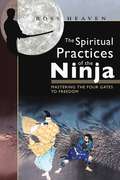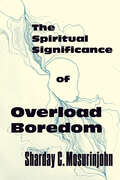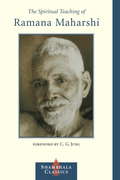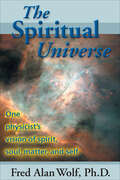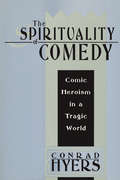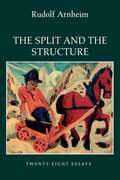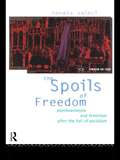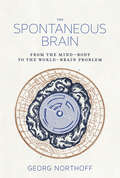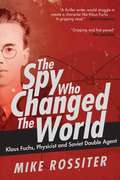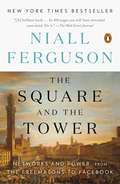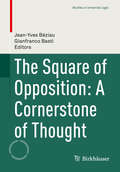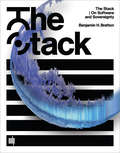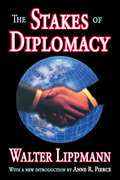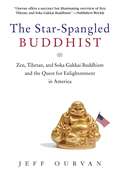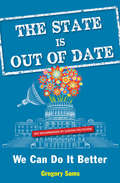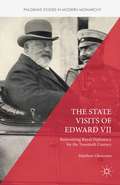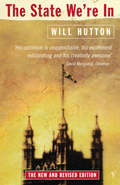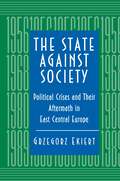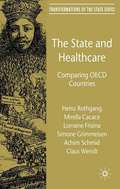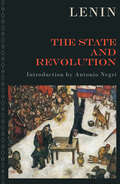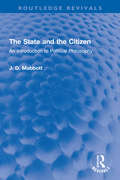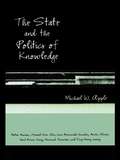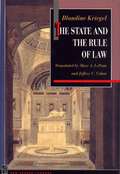- Table View
- List View
The Spiritual Practices of the Ninja: Mastering the Four Gates to Freedom
by Ross HeavenExplains how the initiatory practices of the Ninja can be used to achieve self-mastery• Uses the five human archetypes of lover, seeker, magus, soul warrior, and mystic• Shows how to access kuji-kiri, the positive energy of the Ninja Godai, to dispel fear, disempowerment, and soul fatigue The Ninja are a mysterious warrior elite said to be so spiritually advanced they knew the mind and will of God. Regarded with awe as masters of invisibility and “warriors of the shadow-self,” their legendary skills include the ability to command the elements and transform themselves into Fire, Water, Air, Earth, and Void--the nothingness from which all things stem. In this book Ross Heaven reveals the training exercises and mental discipline used by the Ninja to develop these extraordinary physical, emotional, mental, and spiritual skills.Central to Ninja philosophy is the understanding that there is no higher power than the actualized human being. The Ninja believe there are four gates to freedom, and to pass through them we must overcome four initiatory ordeals. Succeeding at these enables us to combat fear, find true power, clarify our vision, and overcome the soul fatigue that is at the root of our personal and social problems in order to embrace our positive energies and realize our talents.Ross Heaven guides us through these four gateways with exercises and initiations that utilize the energy of the lover, seeker, magus, soul warrior, and mystic as well as dealing with their shadow manifestations that may be causing problems in our lives. We learn how to break the destructive habits of the past and create a bushido, a personal code to live by. Without initiation, we cannot access and channel our energies; they remain uncontrolled or even work against us. Ross Heaven provides the key that allows us to turn these elemental forces into allies.
The Spiritual Significance of Overload Boredom
by Sharday C. MosurinjohnThe spiritual crisis of the twenty-first century is overload boredom. There is more information, content, and stimulation than ever before, and none of it is waiting passively to be consumed. The demands exceed our capacities.The Spiritual Significance of Overload Boredom makes the case that withdrawal and resistance are not our only options: we can choose kēdia, an ethic of care. Rather than conceiving the world of information as external, Sharday Mosurinjohn turns to the sensational and emotional, focusing on the ways the digital age has radically reconfigured our interior lives. Using an innovative method of affective aesthetic speculation, Mosurinjohn engages the world of art, literature, and comedy for a series of unexpected case studies that make strange otherwise familiar scenes of overload boredom: texting, browsing social media, and performing information work. Ultimately, she shows that the opposite of boredom is not interest but meaning, and that we can only make it by curating the overload.The Spiritual Significance of Overload Boredom is a bold and original intervention for the present condition, unsettling the framing of existing work around technological modernity and its discontents.
The Spiritual Teaching of Ramana Maharshi
by C. G. Jung Ramana MaharshiThe renowned Indian sage Ramana Maharshi is beloved by Buddhists, Hindus, Christians, and Taoists alike for the inspirational power of his teachings, which transcend all religious differences. Here is a collection of Sri Ramana's instructions and discourses culled from three works: Who Am I? , Spiritual Instructions , and Maharshi's Gospel. These teachings are arranged by topics such as work and renunciation, silence and solitude, peace and happiness, and the discipline of self-inquiry. Reading this book, presented in question-and-answer format, evokes the feeling of being with this outstanding teacher at one of his intimate teaching sessions.
The Spiritual Teaching of Ramana Maharshi
by C. G. Jung Ramana MaharshiThe renowned Indian sage Ramana Maharshi is beloved by Buddhists, Hindus, Christians, and Taoists alike for the inspirational power of his teachings, which transcend all religious differences. Here is a collection of Sri Ramana's instructions and discourses culled from three works: Who Am I? , Spiritual Instructions , and Maharshi's Gospel. These teachings are arranged by topics such as work and renunciation, silence and solitude, peace and happiness, and the discipline of self-inquiry. Reading this book, presented in question-and-answer format, evokes the feeling of being with this outstanding teacher at one of his intimate teaching sessions.
The Spiritual Universe: One Physicist's Vision of Spirit, Soul, Matter, and Self
by Fred Alan WolfFrom a National Book Award winner, “methodical and clear . . . provides physics-phobics a wide bridge to understanding some often arcane material” (Booklist).Why do we believe in the soul? Does it actually exist? If so, what is it? Does it differ from the self? Does it survive the body after death? In The Spiritual Universe, Fred Alan Wolf brings the most modern perspective of quantum physics to the most ancient questions of religion and philosophy. Taking the reader on a fascinating tour of both Western and Eastern thought, Wolf explains the differing view of the soul in the works of Plato, Aristotle, and St. Thomas, the ancient Egyptian’s belief in the nine forms of the soul, the Qabalistic idea of the soul acting in secret to bring spiritual order to a chaotic universe of matter and energy, and the Buddhist vision of a “nonsoul.” Wolf then mounts a defense of the soul against its modern critics who see it as nothing more than the physical body.“One of the few pathfinders who have discovered the versatility and potency of the new quantum paradigm based on consciousness.” —Amit Goswami, Professor of Physics and author of The Self-Aware Universe“The questions are exhilarating and the conclusions are properly mysterious and profoundly inconclusive . . . you’ll love the spirited journey.” —Thomas Moore, author of Care of the Soul and The Re-Enchantment of Everyday Life“Wolf is a new Thales for a new physics of the soul; his book will blow your mind and quicken your spirit.” —Michael Grosso, Ph.D., author of The Millennium Myth and Frontiers of the Soul
The Spirituality of Comedy: Comic Heroism in a Tragic World
by Conrad HyersTo understand comedy is to understand humanity, for the comic sense is central to what it means to be human. Nearly all the major issues with which human beings have exercised themselves are touched upon in some manner by the comic spirit. Yet education in the art of comedy and in comic appreciation is given little attention in most societies. The Spirituality of Comedy explores the wisdom of comedy and the comic answer to tragedy (in both popular and classical senses of the term). Tragedy is seen as a fundamental problem of human existence, while comedy is its counterweight and resolution.Conrad Hyers has taken a fresh look at comedy from the standpoint of comparative mythology and religion, and thus comedy's spiritual significance. In his unique study of the comic tradition, Hyers explains the difficulty in pinning down themes, structures, plots, or characters that are common to all comedy. Instead he argues that there is an essence of comedy in the area of pattern. He draws upon the rich historical ensemble of types of comic figures: the humorist, comedian, comic hero, rogue, trickster, clown, fool, underdog, and simpleton. He shows how each type incarnates a comic heroism in its own unique manner, offering a profound wisdom and philosophy of life.The approach of this book is broadly interdisciplinary, with materials and interpretations introduced from the various fields of the humanities, social sciences, and natural sciences as they illuminate both the tragic and comic sensibilities. The methodological thread that draws this all together is an analysis of the major types of comic figures in terms of the myths and legends associated with them, the rituals they produce and enact, and the symbolism of the comic figures themselves. Written in a very readable literary style, The Spirituality of Comedy will appeal to psychologists, social scientists, clergy, philosophers, and students of literature.
The Split and the Structure: Twenty-Eight Essays
by Rudolf ArnheimRudolf Arnheim's great forte is his ability to illuminate the perceptual processes that go into the making and reception of artworks—painting, sculpture, architecture, and film. Over the years, his pioneering mode of "reading" art from a unique scientific/philosophic perspective has garnered him an established and devoted audience. That audience will take pleasure in Arnheim's most recent collection of essays, one that covers a range of topics and includes titles such as "Outer Space and Inner Space," "What Is an Aesthetic Fact?," "As I Saw Children's Art," "Two Ways of Being Human," "Consciousness—an Island of Images," and "From Chaos to Wholeness."The notion of structure is Arnheim's guide in these explorations. Most of the essays examine the nature of structure affirmatively: how it comes about, its incentives and objectives, its celebration of perfection. He is interested in how artists grope for structure to shape powerful, enlightening images, and how a scientist's search for truth is a search for structure.Writing with enviable clarity, even when deploying complex arguments, Arnheim makes it easy and exciting to follow him as he thinks. America is not abundantly supplied with "public intellectuals" such as Rudolf Arnheim—to have his writings with us is cause for celebration. "The word 'structure' appears for good reason in the title of this collection. . . . Structure seems to be needed as an arbiter wherever this civilization of ours is split by selfish interests and fighting for either/or decisions. The essays want to speak with the voice of reason, because they want to show how the parts require the whole."
The Spoils of Freedom: Psychoanalysis, Feminism and Ideology after the Fall of Socialism (Opening Out: Feminism for Today)
by Renata SaleclThe rise of nationalist, racist and anti-feminist ideologies is one of the most frightening repercussions of the collapse of socialism. Using psychoanalytic theories of fantasy to investigate why such extremist ideologies have taken hold, Renata Salecl argues that the major social and political changes in post-communist Eastern Europe require a radical re-evaluation of notions of liberal theories of democracy. In doing so she offers a new approach to human rights and feminism grounded in her own active partipation in the struggles, first against communism and now against nationalism and anti-feminism.
The Spontaneous Brain: From the Mind-Body to the World-Brain Problem
by Georg NorthoffAn argument for a Copernican revolution in our consideration of mental features—a shift in which the world-brain problem supersedes the mind-body problem. Philosophers have long debated the mind-body problem—whether to attribute such mental features as consciousness to mind or to body. Meanwhile, neuroscientists search for empirical answers, seeking neural correlates for consciousness, self, and free will. In this book, Georg Northoff does not propose new solutions to the mind-body problem; instead, he questions the problem itself, arguing that it is an empirically, ontologically, and conceptually implausible way to address the existence and reality of mental features. We are better off, he contends, by addressing consciousness and other mental features in terms of the relationship between world and brain; philosophers should consider the world-brain problem rather than the mind-body problem. This calls for a Copernican shift in vantage point—from within the mind or brain to beyond the brain—in our consideration of mental features. Northoff, a neuroscientist, psychiatrist, and philosopher, explains that empirical evidence suggests that the brain's spontaneous activity and its spatiotemporal structure are central to aligning and integrating the brain within the world. This spatiotemporal structure allows the brain to extend beyond itself into body and world, creating the “world-brain relation” that is central to mental features. Northoff makes his argument in empirical, ontological, and epistemic-methodological terms. He discusses current models of the brain and applies these models to recent data on neuronal features underlying consciousness and proposes the world-brain relation as the ontological predisposition for consciousness.
The Spy Who Changed the World: Klaus Fuchs, Physicist and Soviet Double Agent
by Mike RossiterThe incredible true story of a British physicist who was an undercover spy for the Soviets. The world first heard of Klaus Fuchs, the head of theoretical physics at the British Research Establishment at Harwell in February 1950 when he appeared at the Old Bailey, accused of passing secrets to the Soviet Union. For over sixty years disinformation and lies surrounded the story of Klaus Fuchs as the Governments of Britain, the United States and Russia all tried to cover up the truth about his treachery. Piecing together the story from archives in Britain, the United States, Russia and Germany, The Spy Who Changed the World unravels the truth about Fuchs and reveals for the first time his long career of espionage. It proves that he played a pivotal role in Britain's bomb program in the race to keep up with the United States in the atomic age, and that he revealed vital secrets about the atom bomb, as well as the immensely destructive hydrogen bomb to the Soviet Government. It is a dramatic tale of clandestine meetings, deadly secrets, family entanglements and illicit love affairs, all set against the tumultuous years from the rise of Hitler to the start of the Cold War.
The Square and the Tower: Networks and Power, from the Freemasons to Facebook
by Niall Ferguson<P>Most history is hierarchical- it's about popes, presidents, and prime ministers. But what if that's simply because they create the historical archives? What if we are missing equally powerful but less visible networks - leaving them to the conspiracy theorists, with their dreams of all-powerful Illuminati? The twenty-first century has been hailed as the Networked Age. But in The Square and the Tower, Niall Ferguson argues that social networks are nothing new. <P>From the printers and preachers who made the Reformation to the freemasons who led the American Revolution, it was the networkers who disrupted the old order of popes and kings. Far from being novel, our era is the Second Networked Age, with the computer in the role of the printing press. But networks have a dark side, prone to clustering, contagions, and even outages. And the conflicts of the past already have unnerving parallels today, in the time of Facebook, Islamic State and Trumpworld. <P><b>A New York Times Bestseller</b>
The Square of Opposition: A Cornerstone of Thought
by Jean-Yves Béziau Gianfranco BastiThis is a collection of new investigations and discoveries on the theory of opposition (square, hexagon, octagon, polyhedra of opposition) by the best specialists from all over the world. The papers range from historical considerations to new mathematical developments of the theory of opposition including applications to theology, theory of argumentation and metalogic.
The Stack: On Software and Sovereignty (Software Studies)
by Benjamin H. BrattonA comprehensive political and design theory of planetary-scale computation proposing that The Stack—an accidental megastructure—is both a technological apparatus and a model for a new geopolitical architecture. What has planetary-scale computation done to our geopolitical realities? It takes different forms at different scales—from energy and mineral sourcing and subterranean cloud infrastructure to urban software and massive universal addressing systems; from interfaces drawn by the augmentation of the hand and eye to users identified by self—quantification and the arrival of legions of sensors, algorithms, and robots. Together, how do these distort and deform modern political geographies and produce new territories in their own image? In The Stack, Benjamin Bratton proposes that these different genres of computation—smart grids, cloud platforms, mobile apps, smart cities, the Internet of Things, automation—can be seen not as so many species evolving on their own, but as forming a coherent whole: an accidental megastructure called The Stack that is both a computational apparatus and a new governing architecture. We are inside The Stack and it is inside of us. In an account that is both theoretical and technical, drawing on political philosophy, architectural theory, and software studies, Bratton explores six layers of The Stack: Earth, Cloud, City, Address, Interface, User. Each is mapped on its own terms and understood as a component within the larger whole built from hard and soft systems intermingling—not only computational forms but also social, human, and physical forces. This model, informed by the logic of the multilayered structure of protocol “stacks,” in which network technologies operate within a modular and vertical order, offers a comprehensive image of our emerging infrastructure and a platform for its ongoing reinvention. The Stack is an interdisciplinary design brief for a new geopolitics that works with and for planetary-scale computation. Interweaving the continental, urban, and perceptual scales, it shows how we can better build, dwell within, communicate with, and govern our worlds.thestack.org
The Stakes of Diplomacy
by Walter LippmannWalter Lippmann is arguably the most influential journalist in American history. From the time of Woodrow Wilson to the time of Lyndon Johnson, what Walter Lippmann said mattered. His word was valued because of his exceptional capacity for analysis, and because he had the rare ability to make complex ideas and problems manageable and understandable. Lippmann combined the practical and the theoretical and saw them as inseparable. He savored the life of the mind and relished the arena of politics. He was political philosopher, social commentator, political advisor, and activist-intellectual. As the country grappled with an impressive influx of European ideas and with the threatening press of European problems, so did Lippmann. Like President Wilson, he came to believe that the condition of the modern world required that America either act or be acted upon. New methods of communication and propaganda meant that ideas contrary to America's would be widely heard. Reformed liberalism and the projection of that liberalism into a troubled world were the best hedge against totalitarian schemes and imperialist aggression. The Stakes of Diplomacy resulted from Lippmann's assignment by Wilson's Secretary of War Baker, to a project for studying possible terms of peace and ways to influence the world in a liberal-democratic direction. The Stakes of Diplomacy ends both with admiration for the peaceful nature of democracies and a plea for their further influence in the world, and with an understanding that democracy's influence will depend partly upon its physical might and geopolitical collaboration. Lippmann stands as a prominent figure in America's twentieth-century quest for power with honor. He concludes this volume with the warning that there is no safe way and no morally feasible way to turn back from our dangerous mission: "Unless the people who are humane and sympathetic, the people who wish to live and let live, are masters of the situation, the world faces an indefinite vista of conquest and terror."
The Star Spangled Buddhist: Zen, Tibetan, and Soka Gakkai Buddhism and the Quest for Enlightenment in America
by Jeffrey OurvanMillions of Americans call themselves Buddhist or have an interest in Buddhism’s philosophical tenets, attracted to an approach to spirituality that’s grounded in logic and consistent with scientific knowledge. The Star-Spangled Buddhist is a provocative look at these American Buddhists through the three largest movements in the United States: the Soka Gakkai International, Tibetan/Vajrayana Buddhism, and Zen Buddhism. The practice of each of these American schools, unlike most traditional Asian Buddhist sects, is grounded in the notion that all people are capable of attaining enlightenment in “this lifetime.” But the differences between the American Buddhist schools are also profound, spanning the full spectrum of philosophical expression and doctrines. Jeff Ourvan, a lifelong-practicing lay Buddhist, explores the American Buddhist movement through its most popular schools, giving a clearer understanding about what it means to be—and how one might choose to be—a Buddhist in America.
The State Is Out of Date: We Can Do It Better
by Gregory Sams&“A humorous and at times brutally honest overview on many of the problems . . . that we presently endure through our political and cultural divide.&”—Robert Steven Thomas, author of Intelligent Intervention As disillusioned citizens across the planet take to the streets, do you wonder if the world&’s nation states will ever get it right? Does anyone really think that politics is working—aside from those in power and behind it? What if living together in peace and harmony is a more natural condition than what we experience in today&’s conflict-driven culture? We are community animals with built-in empathy, good at organizing things and helping each other out. The most essential and reliable features of our culture arose without top-down planning by a state that has one basic objective—to stay in power. We have enjoyed enduring civilizations in the past governed wholly from the bottom-up, without need of a shepherd and sheepdogs. We can do it again and are more connected than ever before. The State Is Out of Date reassures us that politics is not even the primary game in town, though it sometimes may seem like the only one. It is a book for all those who wonder why politics isn&’t working and what would. &“A book of immense importance that also happens to be immensely readable. Get it now, read it now. You&’ll be amazed, impressed, persuaded, infuriated and filled with hope for a future that awaits us if only we are prepared to make the right choices.&”—Graham Hancock, New York Times bestselling author of America Before &“Gregory Sams is a prophet of conscience.&”—Lanny Cotler, film writer and director
The State Visits of Edward VII: Reinventing Royal Diplomacy for the Twentieth Century (Palgrave Studies in Modern Monarchy)
by Matthew GlencrossThis book explores the revival under Edward VII of the ceremonial state visit by British monarchs, showing the impact and importance of active royal diplomacy during his reign. Using the Royal Archives, memoirs and newspapers, it reveals the contribution made by the use of ceremony and public display to popular appreciation of the monarchy.
The State We're In: (Revised Edition)
by Will HuttonThe number one bestseller on the hardback list for more than six months, The State We're In is the most explosive analysis of British society to have been published for over thirty years. It is now updated for the paperback edition.
The State against Society: Political Crises and Their Aftermath in East Central Europe
by Grzegorz EkiertClassical images of state-socialism developed in contemporary social sciences were founded on simple presuppositions. State-socialist regimes were considered to be politically stable due to their pervasive institutional and ideological control over the everyday lives of their citizens, impervious to reform and change, and representative of extreme political and economic dependency. Despite their contrasting historical experiences, they have been treated as basically identical in their institutional design, social and economic structures, and policies. Grzegorz Ekiert challenges this notion in a comparative analysis of the major political crises in post-1945 East Central Europe: Hungary (1956-63), Czechoslovakia (1968-76), and Poland (1980-89). The author maintains that the nature and consequences of these crises can better explain the distinctive experiences of East Central European countries under communist rule than can the formal characteristics of their political and economic systems or their politically dependent status. He explores how political crises reshaped party-state institutions, redefined relations between party and state institutions, altered the relationship between the state and various groups and organizations within society, and modified the political practices of these regimes. He shows how these events transformed cultural categories, produced collective memories, and imposed long-lasting constraints on mass political behavior and the policy choices of ruling elites. These crises shaped the political evolution of the region, produced important cross-national differences among state-socialist regimes, and contributed to the distinctive patterns of their collapse.
The State and Healthcare: Comparing OECD Countries
by Mirella Cacace Heinz Rothgang Lorraine Frisina Simone Grimmeisen Achim Schmid Claus WendtDescribes developments in healthcare systems over nearly four decades. Combining cross-sectional studies on healthcare financing, provision and policy values with in-depth country studies of Britain, Germany and the USA, this volume is a thorough examination of the convergence toward hybrid forms of healthcare systems.
The State and Revolution
by V. I. LeninLenin collected quotations from the works of Marx and Engels, and extracts from the books by Kautsky, Pannekoek and Bernstein with his own critical notes, conclusions and generalisations.
The State and Revolution
by V. I. LeninLenin's most important and controversial theoretical textLenin&’s booklet The State and Revolution struck the world of Marxist theory like a lightning bolt. Written in the months running up to the October Revolution of 1917, Lenin turned the traditional socialist concept of the state on its head, arguing for the need to smash the organs of the bourgeois state to create a &‘semi-state&’ of soviets, or workers&’ councils, in which ordinary people would take on the functions of the state machine in a new and radically democratic manner.This new edition includes a substantial introduction by renowned theorist Antonio Negri, who argues for the continued relevance of these ideas.
The State and the Citizen: An Introduction to Political Philosophy (Routledge Revivals)
by J. D. MabbottFirst published in 1948, The State and the Citizen traces the development of the idea of the State as the ultimate source of authority. The author then proceeds to suggest the proper ends and limitation of State action. He analyses the conceptions of State unity and corporate loyalty and ends with a discussion on the relations between States and other associations, and between one State and another. This short and lucid introduction to political philosophy is an essential read for students and scholars of political philosophy, philosophy, and political studies.
The State and the Politics of Knowledge
by Michael W. AppleThe State and the Politics of Knowledge extends the insightful arguments Michael Apple provided in Educating the "Right" Way in new and truly international directions. Arguing that schooling is, by definition, political, Apple and his co-authors move beyond a critical analysis to describe numerous ways of interrupting dominance and creating truly democratic and realistic alternatives to the ways markets, standards, testing, and a limited vision of religion are now being pressed into schools.
The State and the Rule of Law (New French Thought Series)
by Blandine KriegelBlandine Kriegel, at one time a collaborator with Michel Foucault, is one of France's foremost political theorists. This translation of her celebrated work L'Etat et les esclaves makes available for English-speaking readers her impassioned defense of the state. Published in France in 1979 and republished in 1989, this work challenged not only the anti-statism of the 1960s but also generations of romanticism in politics that, in Kriegel's view, inadvertently threatened the cause of liberty by refusing to distinguish between the despotic and the lawful state.In a work that addresses the urgent concerns of Europe and the contemporary world as a whole, Kriegel examines the background of modern liberal democracy in the late seventeenth and eighteenth centuries and argues cogently for the future of constitutional social-democracy. She maintains, among other positions, that European liberal democracies would have been impossible without the political basis provided by the lawful state first developed by monarchies. She also shows that early modern centralized states became liberal insofar as they developed a centralized legal system, rather than a centralized administration. In developing these ideas, she presents a picture of the state as a major force for human liberty.
